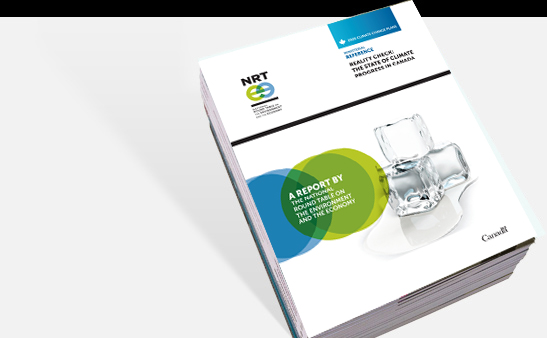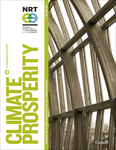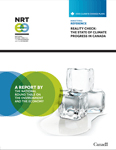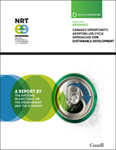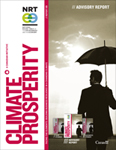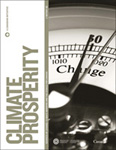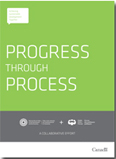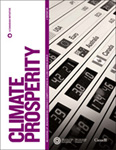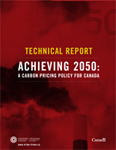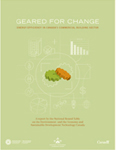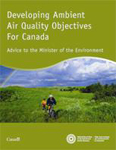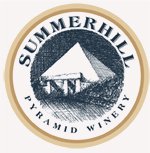Summerhill Pyramid Winery – Case Study
Facing the Elements: Building Business Resilience in a Changing Climate – Case Studies
|
“Diversity is resilience. We need to regenerate, protect and enhance our naturally diverse ecosystems.”– Gabe Cipes, Director of Permaculture and Biodynamics, Summerhill Pyramid Winery |
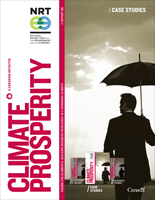
|
AT A GLANCE // |
Location:Kelowna, British Columbia Industry:Agribusiness Employees (2010):40 year round, full time Total Revenue (2010):C$6.9 million |
Key adaptation
|
Adaptation
|
Business BenefitsInternational acclaim within the organic wine market Improved crop quality and pest control without pesticides or fertilizers |
Business ChallengesInitial costs for design, education, labour and inputs to adaptation strategies |
COMPANY OVERVIEW //
KELOWNA , BRITISH COLUMBIA
www.summerhill.bc.ca
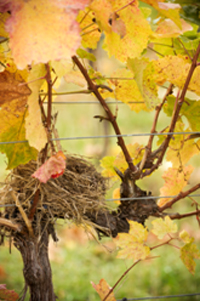
In the vineyard (photo credit:
Summerhill Pyramid Winery)
The winery does not use herbicides, pesticides, or chemical fertilizers in the soil, and approximately one quarter of the vineyard’s 80 acres are given over to wetland and nature habitat. The proprietors’ motivation for organic cultivation comes from a strong commitment to preserving watershed purity and building ecosystem resilience, though this management regime also affords real benefi ts for agribusinesses adapting to a changing climate.
OKANAGAN VITICULTURE IN A CHANGING CLIMATE
Though viticulture currently makes a small contribution to the provincial economy, it is a significant economic sector for the Okanagan region, and recent growth of vineyards and wineries in the Valley has been impressive. There are now over 175 grape wineries in B.C. and several licences pending, up from just 13 in 1984.58 The viticulture industry is also closely tied to the tourism and leisure sectors, which are forecast to expand in future.
The Okanagan Valley sits at the same latitude as northern French and German vineyards, but is also the northernmost tip of the Sonoran Desert, which extends into the Okanagan Valley from Mexico. The long summer days associated with the Okanagan’s northern latitude allow sugars to build up in the fruit, and this is countered by cool nights that prevent the breakdown of acids. The Valley’s unique climate, coupled with soil conditions resulting from pre-historic glacial movement, give this region micro-climates unlike those of any other growing region in the world.
Over the period 1901-1999, minimum daily temperatures (night-time lows) measured at Vernon Coldstream Ranch in the Okanagan have increased by approximately two degrees Celsius.59 Daily maximum temperatures have also increased, but by a smaller margin. Temperature increases are corroborated by records at Kamloops, Summerland, and Cranbrook, indicating a warming trend for the region as a whole. This warming is associated with an increase in the number of frost-free days in the area; Summerland has averaged an increase of 3.1 frost-free days per decade from 1907-1993.60
Several meteorological monitoring stations in the Valley also show a trend toward increased rainfall over the last century. This reflects a larger global tendency towards higher precipitation, which is believed to be a consequence of intensification of the hydrological cycle in response to rising temperatures. 61 This observed increase in precipitation should be seen in the context of population growth and sharply rising demand for water in the Okanagan Basin, a region that has the lowest per capita water supply in Canada.62
CLIMATE CHANGE AND AGRIBUSINESS
The agricultural sector is directly reliant on climatic variables like precipitation and temperature, and is thus likely to experience a wide range of unavoidable impacts as the climate changes.
Rising temperatures may in future exceed the optimum growing conditions for crops. Conversely, warmer temperatures may lead to increases in crop productivity, and the opportunity to cultivate new crops. Changes in hydrological regimes will have a direct effect on agricultural production and production methods. Knock-on impacts on pests, diseases, and competing plants all mean that crops may no longer be viable in current locations under future climate conditions, and crops that remain viable may be of reduced quality.
Any reductions in crop yield and quality as a result of climate change could result in a loss of agricultural income. Unplanned spending to repair damage caused by extreme weather events and other natural hazards (e.g. forest fires) could further exacerbate financial impacts.
Proactive management of climate risks can help to ensure that the agribusiness sector is prepared to cope with, and possibly even benefit from, climate change. The agricultural management practices employed at Summerhill offer several examples of adaptation strategies, all of which strengthen the winery’s capacity to adapt in the face of a changing climate.
A FOCUS ON ECOSYSTEM HEALTH
Summerhill’s proprietors are taking conscious, deliberate steps to preserve watershed purity and build ecosystem resilience. Though their motivations centre on organic wine production rather than adapting to climate change, these actions have the side benefit of making the business (and, indeed, the region) more resilient in the face of a changing climate.
Protecting watersheds
Organic crop management makes use of natural compost and periodic fallow periods, enabling soil to regenerate without fertilizers. These efforts foster healthy plants that are better able to protect themselves from pests and disease, avoiding the need for pesticides. By eschewing the pesticides and fertilizers that are a leading source of agricultural nonpoint source pollution, the winery contributes to protection of water quality. This is particularly significant in the Okanagan Basin, where climate change and population growth are likely to put increasing pressure on water supplies in the decades ahead, outstripping any gains in precipitation. According to results from the Okanagan Water Supply and Demand Project future shortages are likely to occur in late summer when water supplies from surface sources are low and demands for water withdrawals and ecosystem needs are high. Protection of water quality at the watershed level is particularly critical during shortages, when there is less water available to dilute pollutants.
Creating ecosystem resilience
Organic farmers tailor their planting to suit local soil and climate conditions, allowing crops to grow naturally without the use of chemical pesticides and fertilizers. This approach encourages a variety of plants in a single location and promotes biodiversity. For example, Summerhill is experimenting with ecological diversity by interplanting herbs and propagating mushrooms between grapevines. The winery uses established grape row spacing for its experiments in vineyard companion cropping; these native plants should benefit each other and be less susceptible to blight.
Organic agriculture systems have a strong potential for building resilient food systems in the face of uncertainties. Biodiversity increases resilience to changing environmental conditions and stresses. Genetically-diverse populations and species-rich ecosystems have greater potential to adapt to climate change than monocultures.63
By eschewing synthetic fertilizers, organic agricultural systems are forced to adapt to local environmental conditions. Species and varieties are chosen for their adaptability to the local soil and climate and their ability to attract beneficial insects and animals for pest management. Additionally, growing companion crops enhances the soil food webm to sustain the agro-ecosystem’s resilience to external shocks such as extreme weather events (e.g., forest fires or droughts), which are likely to increase as the climate changes.64
By protecting watersheds and building ecosystem resilience, Summerhill has improved the winery’s capacity to adapt to a changing climate.
HANDLING UNCERTAINTY
By promoting diversity and building resilience, Summerhill is implementing effective strategies to cope with change characterized by surprises and unknowable risks. By building resilience in the agro-environmental system, the winery is learning to live with change and uncertainty, as well as increasing options for reducing risks in future.
BENEFITS AND/OR CHALLENGES
Summerhill produces organic wine because of a sincerely held belief that it results in a better product than that which is conventionally produced. However, organic production offers a number of distinct side-benefits to the company. First, buying ‘organic’ makes the consumer’s selection meaningful and simple – a critical benefit in the wine market where product choice is vast and often confusing. Because organic cultivation means association with standards organizations, it offers the tangible benefit of promotion and routes to market by the registered bodies. Finally, there is a significant and growing market of people who share the values of organic producers, particularly health- and environment conscious consumers. Summerhill is well-placed to take advantage of these market opportunities.
The company maintains that there are no disadvantages to protecting watersheds and encouraging robust ecosystems. Though Summerhill will bear initial costs for design, education, labour and inputs to adaptation measures, these will provide financial and ecological self-sufficiency with minimal waste in the long-term.
PERSPECTIVES ON GOVERNMENT ROLES
Summerhill works closely with various stakeholders to protect watersheds and develop the hardiness of surrounding ecosystems. For example, the winery collaborates with the Okanagan Basin Water Board, which aims to facilitate climate change adaptation through improving water efficiency, and developing water policies for sharing during times of shortages. The Water Board has taken a very proactive approach to studying the potential impact of climate change on both water supply and demand for water in the region, evaluating these risks within the context of other important local changes in population, land-use, socio-economic conditions, and technological change. The Water Board consults extensively with customers and has enjoyed a lot of support from the business community, which sees water conservation as part of sensible contingency planning and good management in general. The Okanagan Basin Water Board’s approach highlights the important role that water boards may play in encouraging adaptation in the community.
The winery has also worked with the En’owkin Centre, an indigenous cultural, educational, ecological and creative arts organization. The Centre has shared many insights into using native wild plants and recognizing invasive species. Finally, efforts to save seeds from open pollinated plants and propagate perennial plant guilds along the shelves and floodplains of the winery’s natural watershed and property edges at Summerhill have benefited greatly from the Canada Revenue Agency’s Scientific Research and Experimental Development (SR&ED) tax incentive program. SRED covers 65% of overhead and more than 40% of materials for this research.
NEXT STEPS
As well as its own vineyard holdings, Summerhill has established long term relationships with a dozen small scale family farms, all of them growing organically. The winery is developing training and networking programs to share experience, best practices, and lessons learned on organic wine production. By increasing the range of knowledge on sustainability, and by strengthening local institutions and networks, the proprietors hope to foster local action to protect watersheds and encourage robust ecosystems, further increasing the region’s capacity to adapt to a changing climate.
[m] The ‘soil food web’ refers to the complex system of organisms that live in the soil, and how this system interacts with the environment, plants, and other animals.
[58] British Columbia Wine Institute ND
[59] Cohen and Kulkarni 2001
[60] Cohen and Kulkarni 2001
[61] Cohen and Kulkarni 2001
[62] Okanagan Basin Water Board 2010
[63] Food and Agriculture Organization 2007
[64] Scialabba and Müller-Lindenlauf 2010




